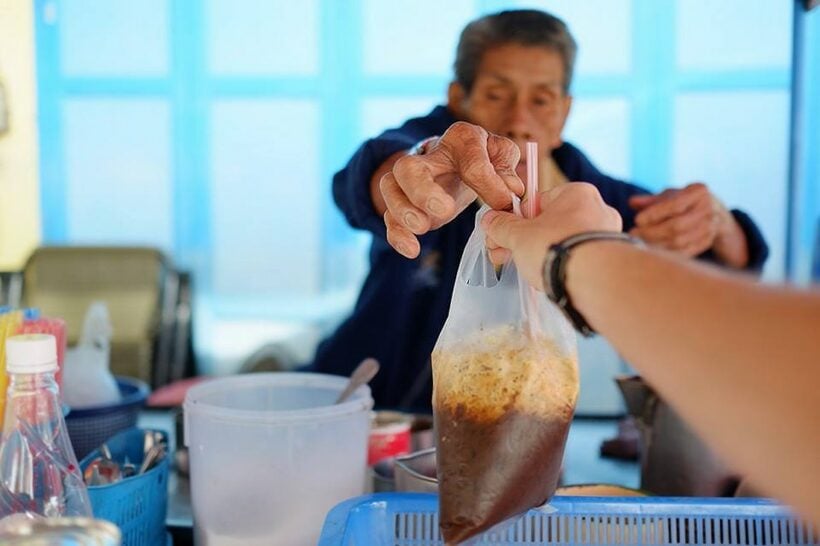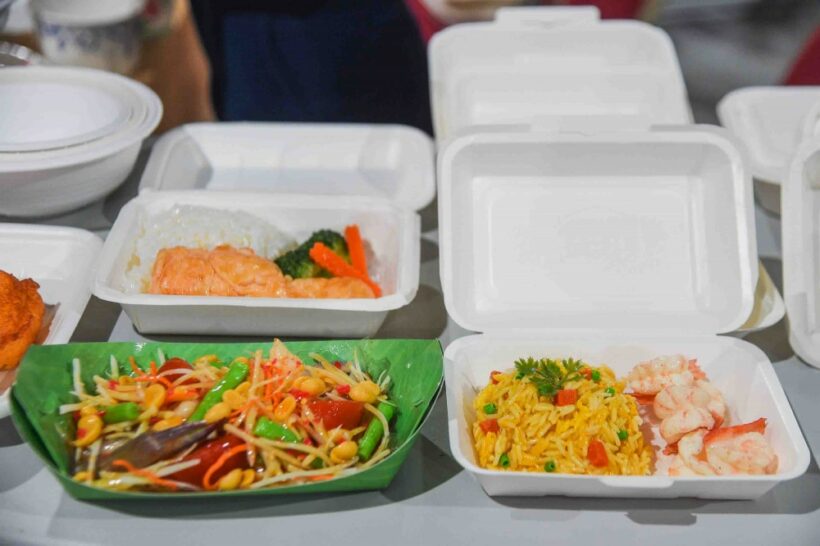Thai industry declares war on plastic pollution

It seems the relentless media reporting, photo evidence, social media and horrendous stories about sea creatures being washed ashore consumed by plastics, has now forced Thai leaders to push the issue of plastic use to the top of their priority list.
20 ministries and the private sector have launched a campaign to reduce the use of plastic bags to mark the World Environment Day on June 5 each year. Every ministry in Thailand has agreed to curb its use of plastic bags and foam packaging as part of the government’s pledge yesterday on World Environment Day.
The natural resources and environment minister, Surasak Karnjanarat, says the campaign will start with efforts to reduce the use of plastic bags with straps (popular with Thais travelling on their motorbikes) and polystyrene in offices.
The campaign theme was announced: “Beat Plastic Pollution: If you can’t reuse it, refuse it.”

Gen Surasak says that during the past 10 years, Thailand has produced about 2 million tonnes of plastic garbage each year. Of this, only 0.5 million tonnes are reused or recycled. He said the plastic trash not only affects health and the environment but also the country’s economy as a whole, he said.
“The government had declared waste management a national agenda.”
“Pictures of rafts of plastic garbage in the ocean and its effects on marine life including sea turtles, whales, dolphins and rare sea animals clearly show that the environment problem caused by plastic waste has become more serious.”
“In 2016 alone, the country had 27 million tonnes of garbage, of them 3.2 million was plastic. The figures coincide with information of the United Nations Environmental Programme which says that as many as 500 billion plastic bags are used worldwide each year. One half of the plastic products are for one-time use – including spoons, forks and cups. Each year more than 13 million tonnes of plastic garbage were dumped into the sea. Thailand is ranked 6th among countries in the world with the highest amounts of plastic garbage,” the minister said.

Website EcoWatch has some important reminders about the use of plastics (republished with permission)….
1. Conventional Plastic Is Made From Fossil Fuels
The vast majority of scientists agree that the primary driver of global climate change is the burning of fossil fuels. And guess what? “Almost all plastics are made from fossil fuels, often by the same companies that produce oil and gas,” Dr. David Suzuki writes. The production of plastic uses around 8 percent of the world’s oil production.
Suzuki notes, “We don’t have to stop using fossil fuels and producing fossil-fuel-derived plastics overnight, but we can’t continue to regard the industry as the backbone of our economies and ways of life, and we must stop being so wasteful.”
2. We’ve Thrown Away Most of the Plastic Ever Made
Since the 1950s, when plastic production started to take off, more than 9 billion tons of plastic have been generated, distributed and discarded. Climate News Network explains, “Of that waste, only 9 percent has been recycled, 12 percent incinerated and 79 percent of what is essentially indestructible man-made material is either in landfill or polluting the environment.”
The three ways we get rid of plastic has its own problems. When it sits in a landfill, harmful chemicals used to produce plastics such as BPA can leach into our groundwater. As for the small amount that gets incinerated, burning the plastic is a major source of air pollution and thus harmful to human health. And while recycling is always encouraged, not only is the process energy intensive, plastics (for now) are not infinitely recyclable. As ScienceNews explained, when plastics break down, they usually break down into molecules that can’t be easily reshaped into plastics or other useful items without going through many different chemical processes.
3. Oceans Have Become a Dumping Ground for Plastic Waste
An estimated 8 million tons of plastics leaches into the oceans each year. The material can be found in the deepest ocean trenches or circulating around and around the world’s five gyres, where it can potentially entangle, choke or kill aquatic life.
Ocean plastic is a minefield for marine creatures, affecting everything from microscopic plankton to giant whales. One study estimated that the debris can be found in the majority of all species of seabirds. Another study found that if we continue to consume plastics in a business-as-usual scenario, the ocean is expected to contain one ton of plastic for every three tons of fish by 2025, and by 2050, more plastics than fish by weight. Of course, the proliferation of plastic and microplastics has prompted concerns that they might work their way up the food chain to us.
4. Governments and Businesses Are Waking Up to the Planet’s Plastic Scourge
Here’s some good news. It seems like every month, a new business, municipality, country, and even an entire continent are taking action against single-use plastics. These entities have introduced or have already enforced bans on items such plastic drinking straws, stirrers, grocery bags, bottles, plastic-lined coffee cups, takeaway foam containers and even non-biodegradable wet wipes.
Last week, the European Union’s executive arm proposed banning the 10 most common single-use plastic products as well as lost and abandoned fishing gear.
“Plastic waste is undeniably a big issue and Europeans need to act together to tackle this problem, because plastic waste ends up in our air, our soil, our oceans, and in our food,” said EU Commission Vice President Frans Timmermans in a statement.
5. You Can Be a Part of the Solution
The United Nations puts it this way: “If you can’t reuse it, refuse it.” For instance, say no to plastic straws at restaurants and bars. Or, you can bring your own eco-friendly alternative.
You can also volunteer at a beach cleanup, pressure your local lawmakers and government to take action, and spread the word to your friends and family. The UN recently launched it #BeatPlasticPollution challenge to encourage people to give up single-use plastics. Participants are asked to announce their commitment on social media and tag their friends to help spread the message within 24 hours.
Former California Governor and staunch environmentalist Arnold Schwarzenegger participated in the challenge. In his video, he pledged to “terminate” plastic spoons in his house and replace them with metal spoons.
“We all have to work very hard to make this a healthy environment, a great environment, and to save our oceans and save the planet,” he said.
Read the rest of their website HERE.
Latest Thailand News
Follow The Thaiger on Google News:


























